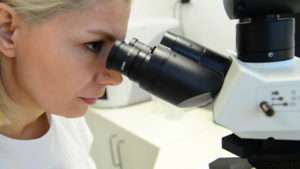Credit: University of Queensland
A new method for producing enough natural pesticide from helpful viruses to make a bio-pesticide commercial viable has been patented by a Queensland scientist.
Dr Leila Matindoost from The University of Queensland is one of ten 2016 Queensland Fresh Science finalists. Her invention paves the way for the worldwide replacement of harmful chemical pesticides.
Leila's research has found a way to double the production of a family of helpful viruses, known as baculoviruses, which can be used as a bio-pesticide.
The baculovirus bio-pesticide is specific for killing the devastating cotton bollworm insect that not only affects cotton but also tomato, corn, eggplant, chickpea and other crops. Thirty per cent of the world's pesticide use targets this pest.
"People have been using caterpillars to harvest the baculovirus on a small scale," says Dr Matindoost. "But this is not commercially viable."
"Instead of caterpillars, my invention uses a large bioreactor so that we can produce enough bio-pesticide to compete with the chemical pesticides currently available.
"Farmers can use their existing machinery to use the bio-pesticide and it should cost about the same as chemicals.
"And the great thing is our pesticide is harmful to insects but harmless to humans."
Credit: University of Queensland
Baculoviruses have been around as long as insects have been around. They cannot multiply in human cells and have no harmful effects on people.
The baculovirus bio-pesticide will kill only the target insects not other beneficial insects.
The invention is currently being commercialised through UniQuest by an international company and is expected to be on the market within five years.
Provided by University of Queensland





















